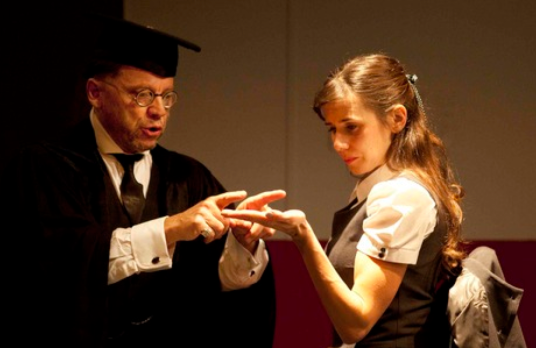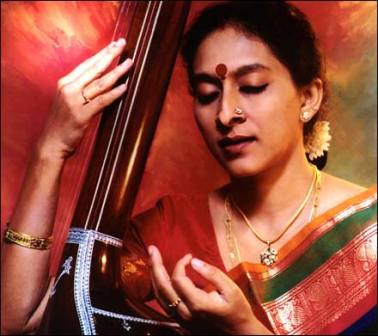An invitation from Bangalore University to speak at a meeting on Pedagogy and Research in the Sciences in Universities (and to listen to other academics) has given me an occasion to think again of what it is that we do when we teach at university, what we do right, and what we do not. There is a certain amorphousness to the enterprise of instruction above a certain level, where intentions and motivations are (in my opinion properly) a bit blurred…
 It also brought to mind, oddly enough, The Lesson, that wonderful play by Ionesco that was such a staple of the amateur drama circuit when I was in college, and which is such a commentary on the nature of the teacher-student relationship and of pedagogy itself.
It also brought to mind, oddly enough, The Lesson, that wonderful play by Ionesco that was such a staple of the amateur drama circuit when I was in college, and which is such a commentary on the nature of the teacher-student relationship and of pedagogy itself.
But I digress. Academic life at an Indian university – and here context is everything – has been undergoing considerable change in the past few years, both because the classroom is changing, and because the student is evolving. Sometimes a little too rapidly for one’s liking. And if truth be told, a little too rapidly for the average instructor’s comprehension, and that includes me.
What is so special about pedagogy and research in the sciences at universities? For one, these are now just one of the several institutions where a science-rich (i.e. a curriculum with a majority of courses in scientific areas) education can be obtained. The IITs, the IISERs and a few other institutions all vie to offer a range of sciences at the undergraduate and Masters’ levels, some in integrated five-year programmes. At the Ph. D. stage, the competition is even wider with all the national laboratories essentially being deemed-to-be-universities. So one difficulty that universities face in re science students is to get them there in the first place.
The difficulty is truly undeserved. There is enough evidence to suggest that students draw significant benefit from having an intellectually diverse academic environment even if their intended area of study, their specialization, is in itself quite narrow. But of course, the range of specializations at a given place is not as important as the quality of the people there, so its a toss-up as to what is preferable. And over the years, as we (as a nation – we are all responsible!) have encouraged the flight of intellect and academic talent out of the universities into the cloisters of research institutes, by policies of preferential funding for the latter over the former, by differential service conditions and numerous other marks of privilege, it is with a heavily biased coin that one calls the toss.
The advantage that universities have, of numbers, is one we should hold on to. A middling sized masters’ class in physics at JNU now has about 30 students, at Bangalore University this number would be 80, and at Delhi about 200. And these numbers offer several opportunities. There are always (and the emphasis is deserved) exceptionally gifted students in such classes, and also always, some really poor students. That’s just the law of large numbers at play. The width of the ability distribution makes teaching such classes a challenge, and (so long as one is not terminally cynical) there is much to learn from the process.
There are matters we take for granted, such as the purpose of higher education (at the postgraduate level and above) in our country. Academic policy makers will trot out graphs to suggest that there is a positive correlation between GDP and the quantum of original research or the number of scientific papers published. So one purpose of university departments is to “produce” postgraduates, Masters and Ph D’s for somewhat ephemeral ends. But then some of these postgraduates will end up in research careers as well, and perhaps in teaching positions, so that the concerns of the seminar acquire an existential angst that is all too familiar.
One can go on. But to return to the theme of the seminar, namely Pedagogy and Research in the Sciences, my few points are the following.
The first is that the role of the teacher in the university classroom has changed drastically in the past few years. The teacher today is not the central source of information in the way he or she was say, twenty years ago. One still gets respect as a teacher, but not in the simplistic ways of the past – one has to earn it every day… This was always true, of course, but now there is a constant comparison with material all over the web, lectures on any topic easily available on YouTube, MOOCs, Wikis… the list is long.
Next, and this might not be true for all subjects, we tend to over-teach. At any rate, we do tend to over-regulate curricula. While that is grist for another post, it is true that students today are left with few real choices, the real freedom to design one’s own learning that comes with the semester system being sacrificed for some form of academic uniformity. I’ve seen “elective” courses being made effectively compulsory year after year, the need for completing a set of credit requirements competing with a shortage of teaching staff. Students are integral to the pedagogic process, and not just as the intended targets. They are as responsible in determining outcomes as teachers are, in ways that need a somewhat more individualized approach.
My main concern however, relates to the modularization of pedagogic practice. Over the years the educational pattern in the country has evolved from the system of annual examinations to a semester system, much like the rest of the world. The standard model of academic teaching that has been adopted in most of our progressive universities is one of semester-wise teaching of a number of courses, each considered a stand-alone subject. It is too late in the day to debate whether it is a good or bad thing, especially when there is so much regulatory pressure to conform to some mythical global standard, but one aspect of such instruction is that it poses new challenges to the didactic process and these challenges have not been seriously addressed.
The unity of a discipline – that which a Department of Study strives to convey – is often missed out in a compartmentalized approach to teaching. The modularity of semester based courses, and in some instances, this is broken up into even smaller modules- can make a discipline seem more granular than it necessarily is.
 The contrasting styles of Hindustani and Carnatic classical music offer some parallels to these two pedagogic approaches. A night-long concert of Hindustani music may well be devoted to a single raga, developing and evolving a theme gradually. A Carnatic concert of a few hours, on the other hand would have several compositions in different ragas and with different tempi. There are those who swear by one and those that swear by another, but in the end, both have their adherents as well as those that simply don’t get either.
The contrasting styles of Hindustani and Carnatic classical music offer some parallels to these two pedagogic approaches. A night-long concert of Hindustani music may well be devoted to a single raga, developing and evolving a theme gradually. A Carnatic concert of a few hours, on the other hand would have several compositions in different ragas and with different tempi. There are those who swear by one and those that swear by another, but in the end, both have their adherents as well as those that simply don’t get either.
 But again, I digress. Modular teaching can lead to modularized learning, with some students feeling that specific topics belong to a specific courses (“… but Hermite polynomials are in quantum mechanics, not mathematical physics … “ or similar plaintive cries that can be heard when discussing the “unfairness” of a question paper…). And this is a concern that is shared by many. Graduate schools in the US often (if not uniformly) have comprehensives and cumulative examinations to address these types of issues, and quite successfully, but our teaching practices have not yet adopted such measures. Some years ago I offered the graduating batch of students in the MSc programme an optional examination after all the others were over. It happened to be a Friday, 13th May and hence the drama in the poster; the few students who took it were enthusiastic (if somewhat bewildered) but the answer scripts were more revealing of the outcomes of two years of teaching and learning…
But again, I digress. Modular teaching can lead to modularized learning, with some students feeling that specific topics belong to a specific courses (“… but Hermite polynomials are in quantum mechanics, not mathematical physics … “ or similar plaintive cries that can be heard when discussing the “unfairness” of a question paper…). And this is a concern that is shared by many. Graduate schools in the US often (if not uniformly) have comprehensives and cumulative examinations to address these types of issues, and quite successfully, but our teaching practices have not yet adopted such measures. Some years ago I offered the graduating batch of students in the MSc programme an optional examination after all the others were over. It happened to be a Friday, 13th May and hence the drama in the poster; the few students who took it were enthusiastic (if somewhat bewildered) but the answer scripts were more revealing of the outcomes of two years of teaching and learning…
In the end, my point is a simple one. Our pedagogy can benefit from the explicit recognition of the collective nature of teaching, where the efficacy of what one teacher imparts depends crucially on what is taught by another. In addition, the question of timing is also important. Especially for core courses, a greater level of coordination and planning is needed. This can greatly improve learning outcomes in all disciplines, but it also requires that we rethink our practices.
Let me close by quoting from a blogpost by Keeling and Hersh on higher education in the US that has considerable resonance with some of the points above. “One challenge […] is that it requires faculty to come together – collectively – and agree on which outcomes, expectations, and standards they share and endorse, and then reinforce them throughout their various courses and programs. It demands a different institutional culture of learning […].” And, I might add, teaching.
